What Will I Learn?
- How to create permissions (Privilege) in MySQL
Requirements
- Xampp
- PC (Windows or Ubuntu)
Difficulty
- Basic
Tutorial Contents
What is Privilege?
In the material database, the term means the privilege rights that are owned by a user. Simply put this privilege can also be referred to as permissions. Use that we just created can not do anything in the MySQL. The user should be granted access (privilege) in advance.
MySQL provides the features enough details about the privilege. His border starting from any query can be executed, the database or the table anything that can be accessed, and which columns to display.
Follow the steps below to create permissions (Privilegepermissions (Privilege):
With the permissions that the user owned the favor this time, learning database inaccessible. Even of the query SHOW DATABASES, databases of learning is not seen. This is because user budi does not have privilege for it.
As a first example, I want to give access rights to the user budi to perform any student into a table that exists in the database. How from the root user type , the following code :

Query the GRANT above can be divided into 3 parts:
Queries are allowed:
GRANT ALL. This means that we allow the userbudito run
all queries.Table or database that allowed: ON
belajar, mahasiswa. This means that a user could query all the favor (ALL) to themahasiswatable in the database isbelajar.For user: TO
budi @ localhost.This is a user who was given permission.
After the query is executed, open cmd window to user budi and check using a query
SHOW GRANTS

Additional new line now looks, i.e. GRANT ALL PRIVILEGES ON belajar, mahasiswa
With the addition of this line, the user budi have given permissions for a table mahasiswa in the database belajar
If we run the query SHOW DATABASES of user budi, learning database is already visible:
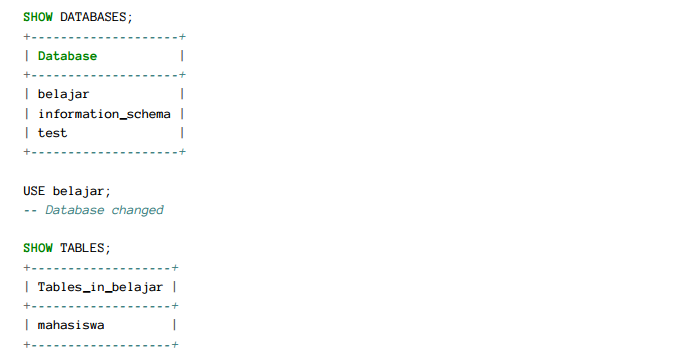
In fact in the database learns there are many tables, but which can be accessed by the user only the favor table belajar . This corresponds to the access rights that we give before.
User budi has ALL PRIVILEGES for the tables of belajar Thus we can run all query into this table.
Following his experiments:

The SELECT query and UPDATE the successful run by user budi to the belajar
Next, let's try to make a more limited query for the user. Switch to the root user, cmd and then run the following query:

The query above means I give the query the SELECT permissions for the table in the database to the user learning. Note that access rights are no longer an ALL GRANT, but GRANT SELECT.
Open a cmd user budi and let's examine the query results SHOW GRANTS:

In the third line of the new right of access arises, namely the use of the SELECT query to table Universitas. Let's try:
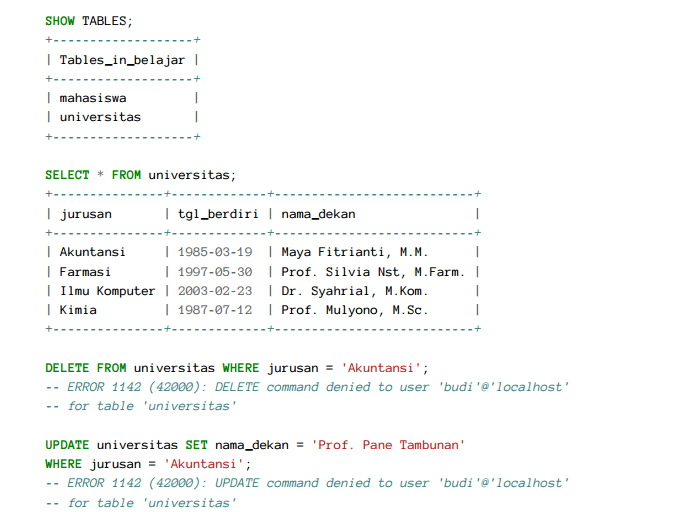
From the results of the query SHOW TABLES, the user budi has been given access rights for a table of the student and the Universitas. Query SELECT *FROM Universitas has started.
But it's not the case with the DELETEand UPDATE queries, at the time of the second run of this command, the results in the form of the message error: command is denied. This happens because the privilege or rights owned by the user theSELECT query is simply the discretion only. In addition to theSELECT query could not be executed for the Universitas
Restrictions on queries like this is important enough to be understood. We can create a user who can only see the data, but cannot modify or delete existing data.
What if it turns out the user budi "promoted" and obtain permission to change existing data in the table is the Universitas? We just added a new access rights. Please open cmd Windows with user root, and then run the following command:

In this command, I give you access rights to the UPDATE query and DELETE userbudi for the Universitas.
The next step is open the cmd Windows for user budi and check of the query SHOW GRANTS:

In the third row is now listed 3 queries are allowed, i.e. SELECT, UPDATE and DELETE for a table of the Universitas
For a test run, you can run the query and updates the previous DELETION and note whether this time user budi was allowed to do so. For a more precise restriction, we can do it up to the level of the column.
For a more precise restriction, we can do it up to the level of the column.That is, a user can be restricted only could see columns of course within a table.
As table sample, I will use my province table created earlier. Overall, the provincial table has 6 columns:

The above display results can only be run from the root user because the user has not been granted discretion the access rights for the provinsi.
Now I want to be able to access the table user budi provinsi, but restricted can only see column nama_prov and budgets only. User discretion is not allowed see the other columns. In addition user budi is also permitted to update a column of a grant.
Open cmd Windows for user root, and follows the way of writing the query the GRANT in need :

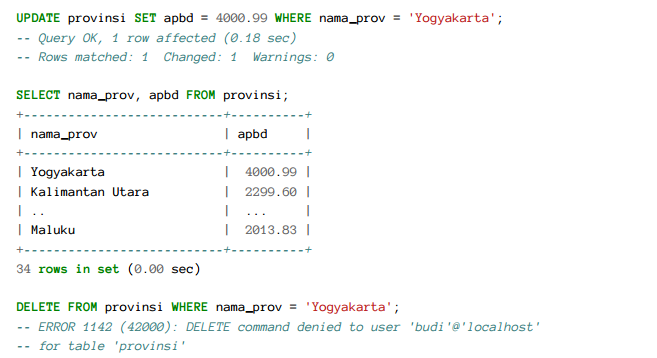
To limit any column can be accessed, write column names after the name of the query.
In the above command, GRANT SELECT (nama_prov, budgets), UPDATE (national) means that the SELECT query is only allowed for columns nama_prov and budgets, as well as UPDATE queries can only be to apdb column only
Let us now try to access the table from user budi provinsi:
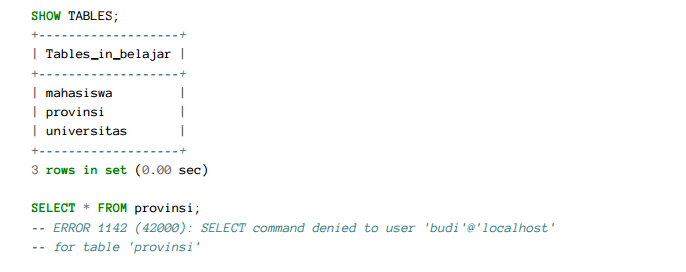
What happened? Why does the query SELECT remain in decline ? Whereas the right of access has been given to the user budi
The reason of the error above is due to the use of SELECT * queries which access the entire column of aka table of provinsi . User budi does not have the rights to the entire column, but only the columns nama_prov and apdb only. Therefore, the SELECT query must be written as follows :
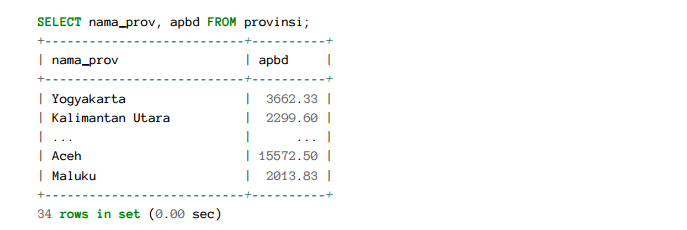
User ``````budi also have privilege to UPDATE the query, but only for columns apdb only:
In the last line I try to run a query to DELETE As we can expect, MySQL will reject this command because user budidoes not have permissions to query.
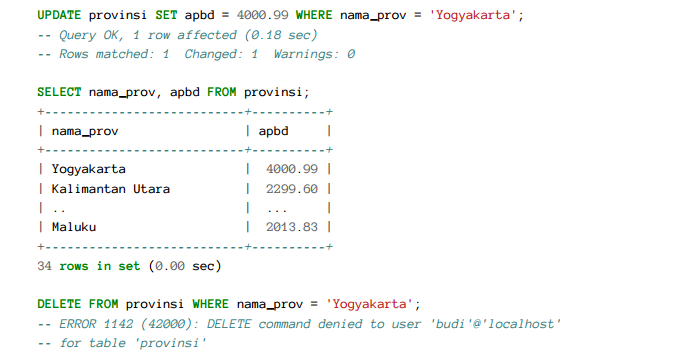
In the last line I try to run a query to DELETE As we can expect, MySQL will reject this command because user budi does not have permissions to query.
Here's my tutorial how to create Permissions (Privilege), may be useful
Posted on Utopian.io - Rewarding Open Source Contributors
Your contribution cannot be approved because it does not follow the Utopian Rules.
You can contact us on Discord.
[utopian-moderator]
thank you @creon